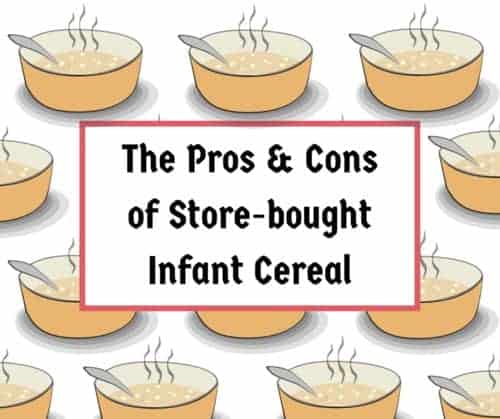
Welcome to Part 3 of my 8 part series: A Dietitian’s Guide to Infant Cereal. My goal in writing this series is to provide you with the education you need about these cereals to make an informed choice about when and what cereals you’d like to feed your baby. To stay connected with me and receive updates on this series, subscribe via RSS, or like Smart Nutrition on facebook!
Part 1: Infant Cereals: Sugarbowls in Disguise?
Part 2: A Brief History of Infant Cereals
Part 4: Can Babies Digest the Starch in Infant Cereals?
Part 5: Should I Make My Own Infant Cereal?
Part 6: How to Choose the Right Infant Cereal
Part 7: Myths About Infant Cereal
Part 8: 5 Ways to Use Infant Cereal
Pros:
- Babies need iron, and infant cereal is a good source of iron for them. For maximum benefit, feed along with a food high in vitamin C such as strawberries, oranges, kiwis, red peppers, broccoli, or kale.
- Most babies accept infant cereal pretty readily. Other foods with stronger flavours, such as meat or fish, don’t tend to be accepted quite as easily; it may take 15-20 tastes of a food before a child will learn to like and accept them. While your baby is learning to like other high iron foods, feeding your baby storebought infant cereal can give her the iron she needs.
- They’re convenient to feed your baby while traveling. Home-prepared high iron baby foods such as egg yolks or tofu need to be kept cold. Using an insulated lunch bag and an ice-pack works well if you’re going to be feeding your baby within 1-2 hours. But this won’t work well on longer trips!
- A good source of iron to feed babies for families that have chosen a vegan or vegetarian lifestyle.
Cons:
- Since infant cereals are only consumed during infancy, they don’t expose children to food that they will be eating along with their families as they get older.
- The second “pro” is also a con! Since babies tend to accept the cereal pretty readily, it can be easy for parents to keep feeding their children the cereal and not persist at exposing them to other foods.
- Only feeding a rice-based cereal may expose an infant to a level of arsenic that is not ideal as high levels of exposure to arsenic have been associated with an increase risk of certain types of cancer.
Did I miss anything? What do you like or not like about store-bought infant cereal?
Part 1: Infant Cereals: Sugarbowls in Disguise?
Part 2: A Brief History of Infant Cereals
Part 4: Can Babies Digest the Starch in Infant Cereals?
Part 5: Should I Make My Own Infant Cereal?
Part 6: How to Choose the Right Infant Cereal
Part 7: Myths About Infant Cereal
Part 8: 5 Ways to Use Infant Cereal
[share title=”Share This Article” facebook=”true” twitter=”true” google_plus=”true” linkedin=”true” pinterest=”true” reddit=”true” email=”true”]


Leave a Reply